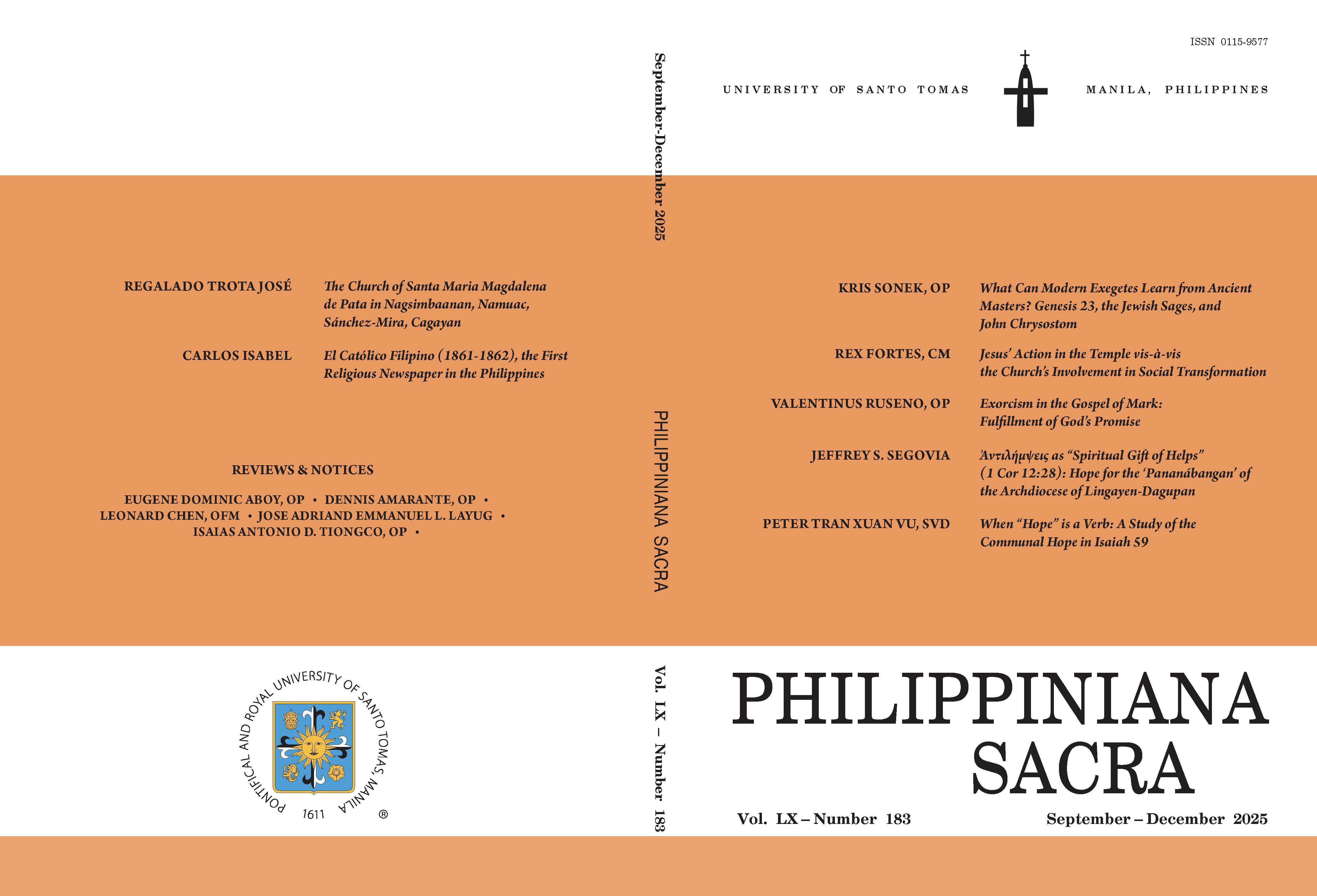CURRENT ISSUE :
Vol. LX - Issue No. 183 : September-December 2025
Foreword
- DOI :
- https://doi.org/10.55997/3015pslx183foreword
- Author/s :
- Clarence C. Marquez, OP
Abstract :
Keywords :
What Can Modern Exegetes Learn from Ancient Masters? Genesis 23, the Jewish Sages, and John Chrysostom
- DOI :
- https://doi.org/10.55997/3001pslx183a1
- Author/s :
- Kris Sonek, OP
Abstract :
Ancient biblical commentaries by rabbinic sages and church fathers are often perceived as enigmatic and arbitrary in contrast with modern interpretative methodology, particularly the historical-critical method. However, while ancient and modern hermeneutical approaches are distinct and largely irreconcilable, modern exegetes can benefit from the rabbinic and patristic works. Using the narrative of Sarah’s death and burial found in Genesis 23, I present the fundamental principles of historical criticism and then contrast them with the assumptions of ancient masters such as the anonymous contributors to Genesis Rabbah and John Chrysostom. Modern exegetes can gain valuable insights from these ancient commentaries. Not only do these works prompt critical examination of contemporary assumptions and exegetical techniques, but they also reveal ways of reviving the great traditions of the ancient synagogue and church.
Keywords : Biblical Interpretation, Biblical Criticism, Genesis, Late Antiquity, Rabbinic Exegesis, Patristic Exegesis, Judaism, John Chrysostom
Jesus’ Action in the Temple vis-à-vis the Church’s Involvement in Social Transformation
- DOI :
- https://doi.org/10.55997/3002pslx183a2
- Author/s :
- Rex F. Fortes, CM
Abstract :
Jesus’ action in the temple (Mk 11:15-19 // Mt 21:10-17 // Lk 19:45-48// Jn 2:13-23) features his radical words and actions against the corrupt temple system, suggesting that rage is permissible to stress moral truth and fight anti-poor measures. However, Christian teaching advocates nonviolence in responding to communal conflicts (cf. Pope Francis’ Message for the 50th World Day of Peace, 2017). Given this dilemma, this paper explores the four Gospel episodes of Jesus’ action in the temple through Narrative Criticism (cf. Culpepper 1983; Ska 1990; Powell 1990, 2020), examining the evangelists’ central messages in their purported common story instead of investigating their contexts with a purely historical critical approach. It argues that the narrative focus is not on Jesus’ vehement activity, but on the hostile response of the Jewish authorities that led to his arrest and crucifixion (cf. NJBC 1990: 954; Freyne 2004:163). Subsequently, it examines the repercussions of the constructed dichotomy of the sacred and the profane in political theology, which is the discussion point for the current Church involvement in social transformation. It draws insights from modern thinkers like William Cavanaugh (2024) and Pope Francis (2025) in seeking the narrative’s relevance to today’s societal issues.
Keywords : Action in the Temple, Narrative Criticism, Church Involvement, Sacred and Profane, Nonviolence, Political Theology, Temple Commerce
Exorcism in the Gospel of Mark: Fulfillment of God’s Promise
- DOI :
- https://doi.org/10.55997//3003pslx183a3
- Author/s :
- Valentinus Bayuhadi Ruseno, OP
Abstract :
In Genesis 3:15, God cursed the serpent and promised that the “woman’s offspring” would crush its head. While a long-standing exegetical debate centers on whether this “offspring” is singular or plural, this study attempts to see beyond that binary choice to offer an alternative perspective. It posits that the promise is uniquely fulfilled within the Gospel tradition, specifically in the Gospel of Mark, and that the process of its fulfillment creatively accommodates both a singular and a collective understanding of the “offspring.” This study argues that through Jesus’ ministry of exorcism, God’s promise to crush the serpent’s head is realized, and Jesus’ authority over impure spirits is clearly demonstrated. Moreover, Jesus delegates this authority to His disciples, and through this divine power, the apostles can cast out demons. In the second Gospel, God’s promise is fulfilled both through one and through many. Therefore, this study aims to explore how Jesus’ ministry of exorcism relates to God’s promise in Genesis 3:15.
To achieve this goal, the study will primarily employ synchronic methods as passages where exorcisms appear will be syntactically examined and their patterns compared. Particular attention will be given to the four exorcism episodes (Mk 1:21-28; 5:1-20; 7:24-30; and 9:14-29) to uncover the pattern of interactions between Jesus and impure spirits, how Jesus performs exorcisms, and the effects of these exorcisms on the malevolent spirits, the possessed individuals, and those around them. Relevant Second Temple Jewish literature may also be used to shed light on the issue of exorcism during this period. Additionally, how these writings understood God’s promise in Genesis 3:15 will be briefly examined and compared to Jesus’ exorcisms. Lastly, some episodes of exorcism involving the disciples (Mark 3:13-16; 9:14-29) will be briefly explored, and their roles will be clarified.
Keywords : gospel of mark, exorcism, protoevangelium, impure spirits, discipleship, apocalyptic literature, demonology
Ἀντιλήμψεις as “Spiritual Gift of Helps” (1 Cor 12:28): Hope for the ‘Pananábangan’ of the Archdiocese of Lingayen-Dagupan
- DOI :
- https://doi.org/10.55997/3004pslx183a4
- Author/s :
- Jeffrey S. Segovia
Abstract :
This work explores Paul’s hapax use of ἀντιλήμψεις (antilempseis) as “helps” in a list of spiritual gifts in 1 Cor 12:28, by analyzing its theological and scriptural impacts and reframing it to the Pananábangan spirituality and pastoral thrust of the Archdiocese of Lingayen-Dagupan, Pangasinan, Philippines. Using the methods of Reception History and Recontextualization, this study investigates the renewed relevance of the spiritual gift of helps in a local Church program of stewardship in communion by the sharing of time, talent, and treasure. It highlights thematic parallels between 1 Cor 12 and Pananábangan, particularly stressing assistance, justice, mutual aid, gratitude, and empowerment. The work also reaffirms the enduring value of ἀντιλήμψεις in the hope of deepening Pananábangan’s living out through the Spirit’s enabling gift of helps.
Keywords : ἀντιλήμψεις, spiritual gift of helps, Pananábangan, recontextualization, reception
When “Hope” is a Verb: A Study of the Communal Hope in Isaiah 59
- DOI :
- https://doi.org/10.55997/3005pslx183a5
- Author/s :
- Peter Tran Xuan Vu, SVD
Abstract :
The Book of the Prophet Isaiah does not use the noun “hope” ( תִִּקְוְָהָ , tiqwāh), but rather various verbal roots, such as וקה (qwh), יחל (yḥl), חכה (ḥkh), to formulate the action “to hope.” Moreover, Isaiah’s vision of hope is expressed with a particular target in a concrete situation-in-life (Sitz im Leben). This study explores the centrality of communal hope amid
the woundedness in Isaiah 59, arguing that the specific content of hoping action, “We hope for the justice” ( נְקְַוֶַּהֶ לַמִַּשְְִׁפָּטָ , nəqaweh lammišpāṭ, v. 11), in the Isaian community, emerges from the “postexilic exile” context, in which both the Lord and people felt the absence of justice אֵיֵן מִשְְִׁפָּטָ) ,ʾên mišpāṭ) The desperate state of justice in the Isaian community is considered the reasonable background of the violent depiction of God and the preferential employment of verbs over nouns to express the communal hope in Isaiah 59. The relevance of Isaiah’s way of describing the communal hope for justice is convincingly presented in the communities and societies where justice is absent due to the wickedness of tyrannical government. The paper appeals to its readers’ sympathy with the victims of injustice brought about by the
“Extrajudicial Killings” (EJKs) or “Extralegal Killings” (ELKs). Isaiah 59, indeed, is the prophetic message of hope for justice at the intervention of the Lord.
Keywords : hope, justice, violence, innocent blood, postexilic exile, YHWH
The Church of Santa Maria Magdalena de Pata in Nagsimbaanan, Namuac, Sánchez-Mira, Cagayan (PHILIPPINIANA RECORDS)
- DOI :
- https://doi.org/10.55997/3006pslx183pr1
- Author/s :
- Regalado Trota José
Abstract :
Keywords :
El Católico Filipino (1861-1862), the First Religious Newspaper in the Philippines (PHILIPPINIANA RECORDS)
- DOI :
- https://doi.org/10.55997/3007pslx183pr2
- Author/s :
- Carlos Isabel
Abstract :
El Católico Filipino [The Catholic Filipino] was a journalistic publication that appeared in 1861 thanks to the initiative of Pedro Peláez, capitular vicar of Manila, and the Dominican priest Francisco Gaínza. Until its disappearance in December 1862, it contributed to the development of the nascent Filipino press. It was also the first newspaper of a religious nature. The aim of this paper is to introduce this publication to today’s reader, offering a descriptive presentation of its main
characteristics, and serving as an introduction to the journalism of that era and to this newspaper in particular, for those researchers who may wish to study it further.
Keywords : 19th century Philippine journalism, Dominican history, Fr. Pedro Peláez, Fr. Francisco Gaínza, OP, Religious newspapers
Molina, Pablo Eduardo Lamata. Descentralización y comunión jerárquica: Relación entre el ministerio petrino y el ministerio episcopal. Ediciones Universidad San Dámaso: Studia Canonica Matritensia, núm. 9, 2025. pp 506. ISBN: 9788410270107. (REVIEWS & NOTICES)
- DOI :
- https://doi.org/10.55997/3008pslx183br1
- Author/s :
- Isaias Antonio D. Tiongco, OP
Abstract :
Keywords :
Bello, Angela Ales. Edith Stein and Edmund Husserl Philosophical Exchanges. Trans. by Antonio Calcagno. Maryland: Lexington Books, 2025. pp. 213. ISBN: 9781666957013. (REVIEWS & NOTICES)
- DOI :
- https://doi.org/10.55997/3009pslx183br2
- Author/s :
- Jose Adriand Emmanuel L. Layug
Abstract :
Keywords :
Magboo, Cecilio Vladimir E., OP. Being A Church of the Poor: The Philippine Catholic Church and the Iglesia Filipina Independiente Towards Growth in Unity and Mission. Manila: University of Santo Tomas Publishing House, 2023. pp. 440. ISBN 978-971-506-923-6. (REVIEWS & NOTICES)
- DOI :
- https://doi.org/10.55997/3010pslx183br3
- Author/s :
- Eugene Dominic Aboy, OP
Abstract :
Keywords :
Thompson, Augustine, O.P. Dominican Brothers: Conversi, Lay and Cooperator Friars. Chicago: New Priory Press, 2017. pp 342. ISBN: 978-1623110567. (REVIEWS & NOTICES)
- DOI :
- https://doi.org/10.55997/3011pslx183br4
- Author/s :
- Dennis Amarante, OP
Abstract :
Keywords :
Ticozzi, Sergio. China and the Catholic Church through Mutual Eyes. Singapore: Palgrave Macmillan, 2023. pp. 166. ISBN 978-981-99-3172-9 (hardcover). ISBN 978-981-99-3173-6 (e-Book). (REVIEWS & NOTICES)
- DOI :
- https://doi.org/10.55997/3012pslx183br5
- Author/s :
- Leonard Chen, OFM
Abstract :
Keywords :
Index of Philippiniana Sacra Vol. LX, nos. 181-182-183 (2025)
- DOI :
- https://doi.org/10.55997/3013pslx183index
- Author/s :
Abstract :
Keywords :
Authors’ Biographies Vol. LX, nos. 181-182-183 (2025)
- DOI :
- https://doi.org/10.55997/3014pslx183bio
- Author/s :
Abstract :
Keywords :
Editor's Note

Rev. Fr. Clarence Victor C. Marquez, O.P., SThD
Editor-in-chief
לשמע בקול תודה ולספר כל נפלאותיך׃
“That I may publish with the voice of thanksgiving, and tell of all thy wondrous works”
(Psalm 26:7 KJV)
The sufficient reason for the Office for Ecclesiastical Publications, for the enduring publishing of Philippiniana Sacra (since 1966) and Boletin Eclesiastico de Filipinas (since 1923), is Preaching, the unhindered proclamation of the gospel for salvation of souls, which remains as the true mission of the University of Santo Tomas, indeed, of the Order of Preachers.
Ours is a ministry of the Word - received and read, thought and taught in the Ecclesiastical Faculties of UST, through the Philippiniana Sacra; as texts written and published, disseminated and distributed in the service of the different dioceses of the Church in the Philippines, through the Boletin Eclesiastico de Filipinas.
And in this age of social communications and artificial intelligence, we take up the challenge and task of exploring and utilizing ethically these modern means in order to further the reach of our preaching, to render our message ever ancient, ever new, through means and media relevant and responsive, to be present in these new areopagi, to engage in the dialogue of life and of faith, to serve the truth in charity, to seek to sustain our efforts with focused studies and strategies, to journey with the people of God, especially the poor and the afflicted, towards the reign of God.
“Come and see…,” “ask, seek, knock…” Let these texts, both in printed and in digital forms, be testaments and testimonies to the TRUTH that sets us free, the WORD made human, “who was from the beginning, whom we have heard, whom we have seen with our eyes, whom we have looked upon, and touched with our hands, the WORD of Life… so that you too may have fellowship… so that our joy may be complete” (cf. 1 John 1:1-4).


